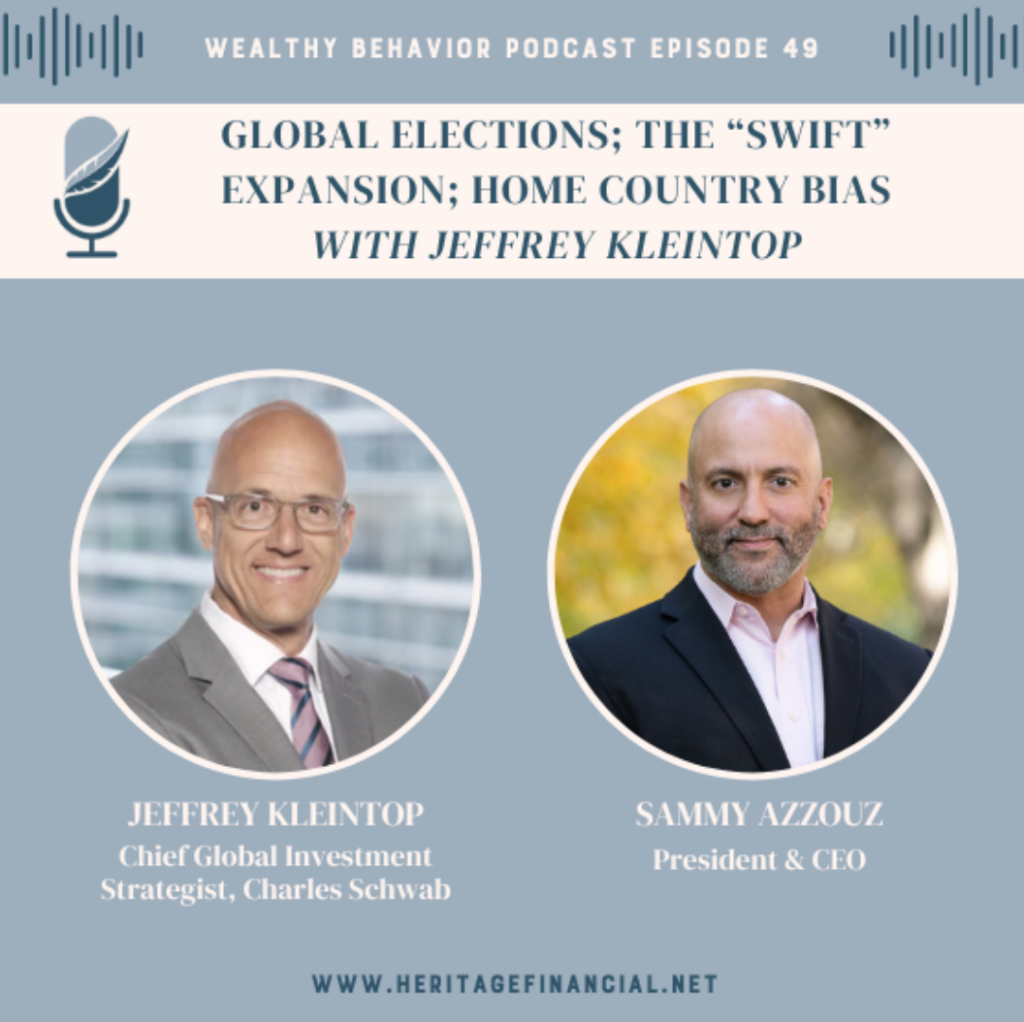International Investing
In the latest edition of the Wealthy Behavior podcast, I spoke to Jeffrey Kleintop, Chief Global Investment Strategist at Charles Schwab about many things, including:
- Why he’s excited for investors in international markets
- Whether geopolitical concerns should matter to investors and the impact of this year’s elections on markets
- The uptick in manufacturing due to the end of the “Swift” expansion and which markets will benefit
- Why international markets are poised to outperform in this new cycle
- The negative consequences of having a home country bias in your portfolio
- What inflation looks like overseas and expectations for central banks

Global Elections; The “Swift” Expansion; Home Country Bias & More with Jeffrey Kleintop
- “Markets and economics tend to have a bigger impact on politics than the other way around.” This was Jeff’s way of sharing that while there are reasons to be concerned about global events, geopolitics doesn’t move markets nearly as much as investors fear and you shouldn’t make portfolio changes based on them.
- Half of the world’s population is voting in elections this year. We could see a trend to nationalist policies hindering trade in manufactured goods through tariffs and trade restrictions. Inflation could tick higher and weigh on exports and the economies of exporting countries. However, we’ve heard this fear before and need to take it with a grain of salt. The high inflation we are coming out of wasn’t caused by tariffs and trade policies.
- There’s an uptick in manufacturing he’s seeing through his favorite economic number – the global purchasing manager’s index. This should help countries like Japan, Germany, the UK, and investors in developed international markets overall as those countries are well represented in the indices.
- Different economic cycles bring different winners and losers, and we’re in a new cycle now where if you look beyond the small handful of U.S. AI-related stocks, you’ll see that international stocks have started to outperform. Jeff is optimistic this will continue. Europe did better than the U.S. last year, and it has continued this year. Japan is also outperforming the U.S. this year. Furthermore, since the market bottom in October, 2022 the average international stock is outperforming the average U.S. stock by ten percentage points.
- The emerging markets composition has shifted to investors’ benefit. China used to be 50% of the EM stock market index, but that has come down to about 22%. India’s share of the index has grown substantially. China’s economy is facing challenges that its leadership didn’t address, while India is booming. Latin America and the Middle East should also benefit from a rebound in manufacturing and commodity prices.
- Investors should avoid home country bias, which means concentrating their portfolios in the stocks of their home country. It leads to a lack of diversification and portfolio concentration risk since the stock markets of many countries can look like sector funds. Japan’s market is concentrated in the financial sector, Germany looks like an auto ETF, and the U.S. has become concentrated in tech stocks.
- International exposure makes sense now as U.S. stocks are trading at a 30% valuation premium to their ten-year average, while international stocks are trading at a 15% discount to their ten-year average.
Missed an episode? Catch-up on Wealthy Behavior here.
